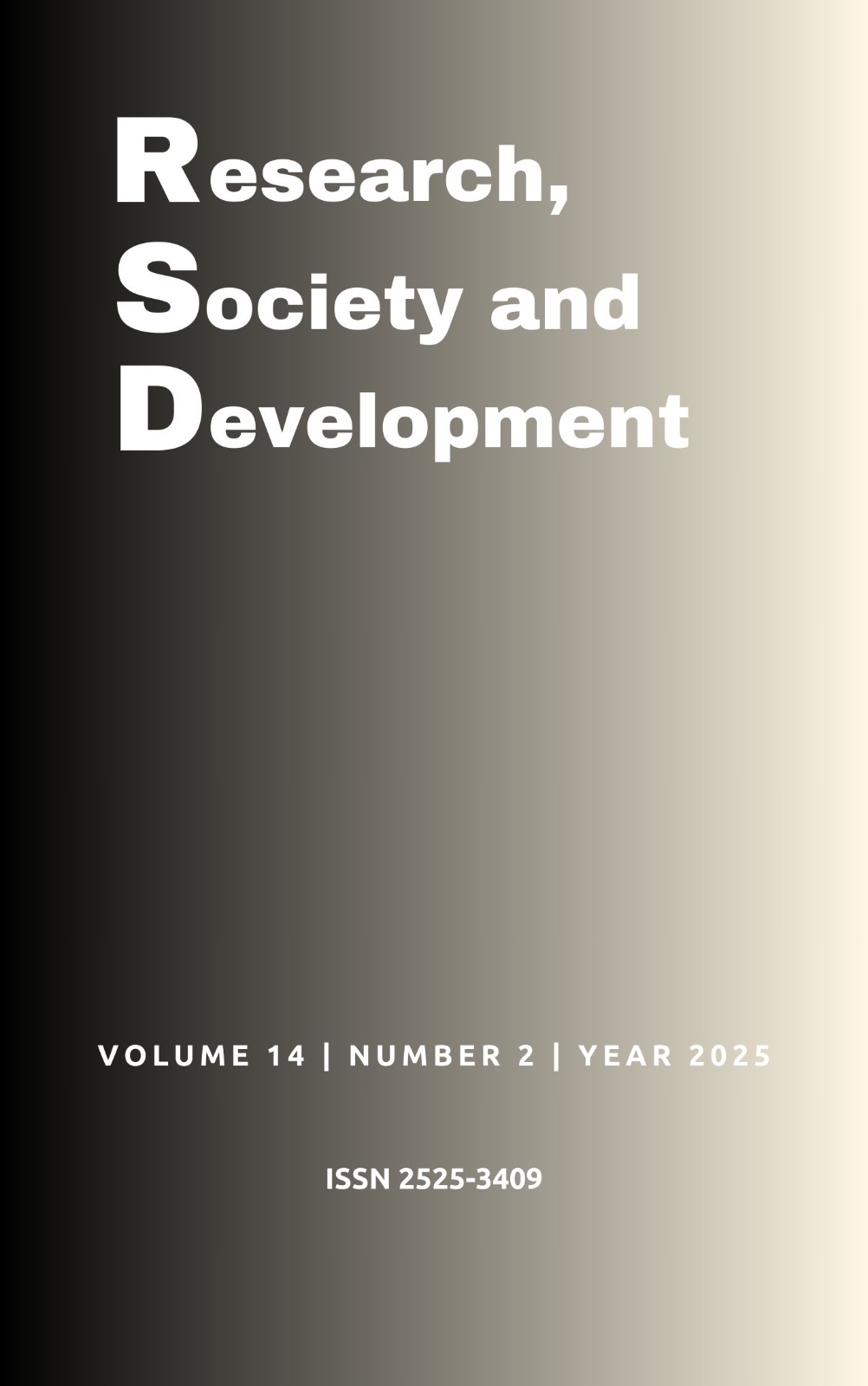Um olhar sobre a produção textual no ensino fundamental II: O modo de ensino de redação nas escolas públicas estaduais da cidade de Manaus
DOI:
https://doi.org/10.33448/rsd-v14i2.48354Palavras-chave:
Base Nacional Comum Curricular, Linguística Textual, Ensino, Ensino e Aprendizagem, Referencial Curricular Amazonense.Resumo
O objetivo deste estudo é contribuir com os Cursos de Língua e Literatura Portuguesa das universidades públicas e particulares, esses cursos responsáveis por parte significativa da formação dos professores do Ensino Básico no estado e com a sociedade de um modo geral, uma vez que o trabalho está voltado à Linguística Textual, na tentativa de observar se estão sendo cumpridos aquilo que os documentos oficiais preveem para a produção textual. Busca-se compreender como as propostas curriculares relacionadas à Linguística Textual estão sendo aplicadas nas salas de aula. A metodologia utilizada é uma pesquisa bibliográfica, fundamentada em autores como Marcuschi, Proença Filho e Eni Orlandi, para embasar teoricamente o estudo. Nas considerações finais, o estudo ressalta os desafios ainda existentes, como a necessidade de formação continuada para professores e a contextualização dos conteúdos no meio social das escolas. No entanto, destaca-se que investir na valorização da Linguística Textual pode favorecer uma educação mais significativa, comunicativa e libertadora, que estimula o desenvolvimento das competências linguísticas dos estudantes.
Referências
Antunes, I. (2003). Aula de Português: encontro & interação. São Paulo: Parábola Editorial
Bazerman, C. (2006). A dinâmica da escrita acadêmica: como as práticas de escrita moldam as formas de conhecimento. Editora Cortez.
Bentes. A.C. (2007). Linguística textual. Introdução à linguística. Domínios e fronteiras. Volume 1. (7ª ed.). Editora Cortez.
Brandão, H. N. (2004). Introdução à Análise do Discurso. (2 ed.). Editora da UNICAMP.
Brasil. (2016). Ministério da Educação. Base Nacional Comum Curricular. Proposta preliminar. Segunda versão revista. Brasília: MEC. http://basenacionalcomum.mec.gov.br.
Chiavenato, I. (2004). Comportamento Organizacional: A Dinâmica do Sucesso das Organizações. Editora Thonson,
Dias, C. A. (2013). Tecnologias e novos modos de comunicação. A (re)invenção do conhecimento no ciberespaço na percepção dos docentes imigrantes digitais de uma universidade pública. Dissertação de Mestrado. Programa de Pós-Graduação em Cognição e Linguagem. UENF.
Fundação L. (2017), A aprovação e a homologação da BNCC. https://fundacaolemann.org.br/noticias/a-aprovacao-e-a-homologacao-da-bncc
Gil, A. C. (2017). Como elaborar projetos de pesquisa. 6. Ed. São Paulo: Atlas. Bibliografia. ISBN 978-85-97-01292- 7
Giovanninni, G. (Org). (1987). Evolução na Comunicação Do Sílex ao Silício. (trad. Wilma Freitas Ronald de Carvalho). Rio de Janeiro: Nova Fronteira.
Grigoletto, E. (2015). Embates entre a memória e o arquivo: modos de dizer e (re)significar a figura do Cangaceiro na rede. In: GRIGOLETTO, Evandra; GOMES, Inara, Ribeiro. (org.). Memória, história, arquivo: fronteiras e intersecções. v. 1. Recife: Editora Universitária UFPE, p. 25-37. https://link.ufms.br/RwfII.
King, G.; Keohane, R.; Verba, S. (1994). Designing Social Inquiry: Scientific Inference in Qualitative Research. New Jersey. Princeton University Press.
Koch, I. (2004). A coesão textual. (19. ed.). Editora Contexto.
Marcuschi, L. A. (2005). Da fala para a escrita: atividades de retextualização. (6. ed.).
Marcuschi, L. A. (2008). Produção textual, análise de gêneros e compreensão. Parábola Editorial.
Nascimento, N. C. V. (2024). O ensino da produção de textos nos Anos Iniciais do Ensino Fundamental: contextos reflexivos para o 5º Ano.
Orlandi, E. (2012). Análise de discurso: princípios e procedimentos. (10. ed.). Pontes Editores.
Orlandi, E. (2006). Conversa com Eni Orlandi. In. BARRETO, Raquel. Teias: Rio de Janeiro, 7(13-14),, jan/dez. https://link.ufms.br/TtwcP.
Petter, M. (2010). Linguagem, língua, Linguística. In: FIORIN, José Luiz (Org.). Introdução à Linguística. I - Objetos teóricos. 6 ed. São Paulo: Contexto. ISBN: 978-85-7244-192-6. Disponível na Biblioteca Digital da UFMS.
Pereira A. S. et al. (2018). Metodologia da pesquisa científica. [e-book gratuito]. Editora UAB/NTE/UFSM. 9).
.
Prestes, M. L. de M. (2007). A pesquisa e a construção do conhecimento científico: do planejamento aos textos, da escola à academia. (3. ed.). Editora Rêspel.
Proença Filho, D.(1994). Estilos de época na literatura. (14.ed.). Editora Ática.
Rca. (2018). Referencial Curricular Amazonense (RCA) - Ensino Fundamental - Anos Iniciais. https://observatoriodeeducacao.institutounibanco.org.br/cedoc/detalhe/tf-referencial-curricular-amazonense-rca-ensino-fundamental-anos-iniciais,9763ebe3-0cc7-4631-a10f-09a734a2f9ec
Seabra, M. C. T. C. de. (2015). Língua, cultura, léxico. In: SobraL, Gilberto, N. T; Lopes, N. da S.; Ramos, J. M. Linguagem, sociedade e discurso. Editora Blucher, p. 65-84.
Silva C. L. (2024). Verbos de percepção como marcadores argumentativos na produção textual: uma proposta teórica e aplicada.
Silva, G. P. da. (2023). Desenho de pesquisa. Edição revisada. -- Brasília: Enap. p.8
Tardif, M. (2014). Saberes docentes e formação profissional, (17.ed.). Editora Vozes.
Vieira, A. da S. (2017).A formação continuada dos professores de correção de fluxo e a aprendizagem dos alunos. Manaus: BK Editora. ISBN 987 65 88024 44
Downloads
Publicado
Edição
Seção
Licença
Copyright (c) 2025 Débora Vieira Marialves; Marcos Antonio Evangelista; Maria Miriam Evangelista Rodrigues; Ana Maria da Silva Gama Barbosa; Patricia de Almeida Silva Repolho; Francilei dos Santos Pessoa; Auricélia da Silva Vieira; Raimunda Ferreira Alves; Roberta Abdias Matos; Antônio Souza Anselmo

Este trabalho está licenciado sob uma licença Creative Commons Attribution 4.0 International License.
Autores que publicam nesta revista concordam com os seguintes termos:
1) Autores mantém os direitos autorais e concedem à revista o direito de primeira publicação, com o trabalho simultaneamente licenciado sob a Licença Creative Commons Attribution que permite o compartilhamento do trabalho com reconhecimento da autoria e publicação inicial nesta revista.
2) Autores têm autorização para assumir contratos adicionais separadamente, para distribuição não-exclusiva da versão do trabalho publicada nesta revista (ex.: publicar em repositório institucional ou como capítulo de livro), com reconhecimento de autoria e publicação inicial nesta revista.
3) Autores têm permissão e são estimulados a publicar e distribuir seu trabalho online (ex.: em repositórios institucionais ou na sua página pessoal) a qualquer ponto antes ou durante o processo editorial, já que isso pode gerar alterações produtivas, bem como aumentar o impacto e a citação do trabalho publicado.


